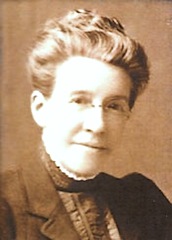Jessie Penn-Lewis
(1861–1927)
 Jessie Penn-Lewis was a Welsh evangelical speaker and author of a number of Christian evangelical works.
Jessie Penn-Lewis was a Welsh evangelical speaker and author of a number of Christian evangelical works.
Early lifePenn-Lewis was born in Victoria Terrace, Neath in 1861[1]. Her father was a Methodist minister. She was married to William Penn-Lewis.
Welsh revivalShe was involved in the 1904-1905 Welsh Revival, one of the largest Christian revivals ever to break out, although the revival was abruptly shortened with the mental and physical collapse of one of the leaders, Evan Roberts. Penn-Lewis traveled internationally to take her message to audiences in Russia, Scandinavia, Canada, the U.S., and India.
Penn-Lewis was close to Evan Roberts and there is some controversy associated with her influence over him. After the breakdown by Roberts cut the revival short, he stayed with the Penn-Lewis’s for a couple of years, but never fully recovered. Ultimately, Penn-Lewis declared some of phenomena of the Welsh Revival to be the work of Satan, declaring her still controversial position in her book on spiritual warfare called War on the Saints, which describes the work of demons on Christians, the theme for which Penn-Lewis is most known.
Influences
Penn-Lewis was influenced by the reformed South African writer Andrew Murray among others, and her books contain quotes from him and references to his works. Frank Buchman, the founder of the Oxford Group, credits Penn-Lewis with helping him to turn his life around from depression when he heard her speak at a Keswick Convention.[3] She also influenced Johan Oscar Smith, the founder of Brunstad Christian Church and the missionary statesman Norman Grubb.
![eva[3]](http://www.wellsofgrace.com/test/wp-content/uploads/2012/06/eva3-e1339014370740.jpg)